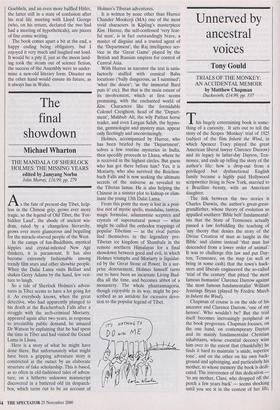The final showdown
Michael Wharton
THE MANDALA OF SHERLOCK HOLMES: THE MISSING YEARS edited by Jamyang Norbu John Murray, £16.99, pp. 279 As the fate of present-day Tibet, help- less in the Chinese grip, grows ever more tragic, so the legend of Old Tibet, the 'For- bidden Land', the abode of ancient wis- dbm, ruled by a changeless hierarchy, grows ever more glamorous and beguiling for the miracle-starved people of the West.
In the camps of fun-Buddhists, mystical hippies and crystal-infested New Age thinkers, it is paramount. It has also become extremely fashionable among trendy film stars and other showbiz people. When the Dalai Lama visits Belfast and shakes Gerry Adams by the hand, few ven- ture to laugh.
So a tale of Sherlock Holmes's adven- tures in Tibet seems to have a lot going for it. As everybody knows, when the great detective, who had apparently plunged to his death at the Reichenbach Falls after a struggle with the arch-criminal Moriarty, appeared again after two years, in response to irresistible public demand, he amazed Dr Watson by explaining that he had spent the time in Tibet and had visited the Grand Lama in Lhasa.
Here is a story of what he might have done there. But unfortunately what might have been a gripping adventure story is constricted at the outset by an elaborate structure of fake scholarship. This is based, as so often in old-fashioned tales of adven- ture, on a hitherto unknown manuscript discovered in a battered old tin despatch- box, which turns out to be an account of Holmes's Tibetan adventures.
It is written by none other than Hurree Chander Mookerji (MA) one of the most vivid characters in Kipling's masterpiece Kim. Hurree, the self-confessed 'very fear- ful man', is in fact outstandingly brave, a master of disguise and a trusted agent of the 'Department', the Raj intelligence ser- vice in the 'Great Game' played by the British and Russian empires for control of Central Asia.
With Hurree as narrator the text is satis- factorily stuffed with comical Babu locutions (`bally dangerous, as I surmised'; `what the deuce'; 'as the immortal Bard puts it' etc). But that is the main extent of its involvement, which at first seems promising, with the enchanted world of Kim. Characters like the formidable Colonel Creighton, head of the 'Depart- ment', Mahbub Ali, the wily Pathan horse trader, and even Lurgan Sahib, the hypno- tist, gemmologist and mystery man, appear only fleetingly and unconvincingly.
Holmes, accompanied by Hurree, who has been briefed by the 'Department', solves a few routine mysteries in India, then speedily proceeds to Lhasa, where he is received in the highest circles. But guess who has got there before him? Yes, it is Moriarty, who also survived the Reichen- bach Falls and is now seeking the ultimate secrets of the universe as revealed to the Tibetan lamas. He is also helping the Chinese in a sinister plot to kidnap or elim- inate the young 13th Dalai Lama.
From this point the story is lost in a posi- tive riot of mystic spells, mandalas, tantras, magic formulae, adamantine sceptres and crystals of supernatural power — what might be called the orthodox trappings of popular Tibetism — as the rival parties find themselves in the legendary pre- Tibetan ice kingdom of Shambala in the remote northern Himalayas for a final showdown between good and evil, in which Holmes triumphs and Moriarty is liquidat- ed by the Great Stone of Power. In a sur- prise denouement, Holmes himself turns out to have been an incarnate Living Bud- dha all the time, and becomes abbot of a monastery. The whole phantasmagoria, though enjoyable in its way, might be pre- scribed as an antidote for excessive devo- tion to the popular legend of Tibet.





























































































 Previous page
Previous page